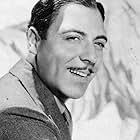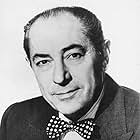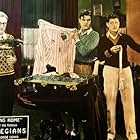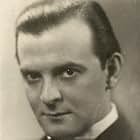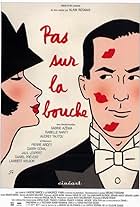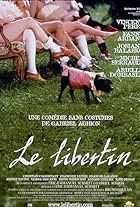When an OSS officer returns to Italy to uncover the informer who cost lives of villagers, he unexpectedly finds out that his lover is alive and connected to the traitor.When an OSS officer returns to Italy to uncover the informer who cost lives of villagers, he unexpectedly finds out that his lover is alive and connected to the traitor.When an OSS officer returns to Italy to uncover the informer who cost lives of villagers, he unexpectedly finds out that his lover is alive and connected to the traitor.
- Won 1 Oscar
- 2 wins total
Russ Tamblyn
- Pietro
- (as Rusty Tamblyn)
Maria J. Tavares
- Lucia
- (as Maria Tavares)
Ernö Verebes
- Detective
- (as Erno Verebes)
- Director
- Writers
- All cast & crew
- Production, box office & more at IMDbPro
Storyline
Did you know
- Trivia"Mona Lisa" was the first song not performed in English to win an Oscar for Best Song. Amazingly, it was more than fifty years before another foreign language composition took the gold. As of 2020, only two songs have accomplished the feat: "Al Otro Lado Del Rio" from The Motorcycle Diaries (2004) and "Jai Ho" from Slumdog Millionaire (2008).
- ConnectionsReferenced in Rear Window (1954)
- SoundtracksMona Lisa
Written by Jay Livingston and Ray Evans
Featured review
Captain Carey, U.S.A. (1950)
A vastly underrated movie. Not that this is "Casablanca" although there are traces of the same idea, if deliberately backward. A romance is derailed by war, a solitary American exudes indifference, foreign intrigues brew, and the Nazis roam at night causing trouble.
The setting is Italy, at first during the war, and then three years later. The man, Alan Ladd (at his best, I think), is an OSS officer and when he returns, as a civilian, you know he has an agenda and a dangerous background. And a girl he once loved who is dead.
Or so it goes. The plot is reasonable and actually fascinating. It doesn't unfold with elegance, exactly (you can see a lot of the gist coming), but it is all told beautifully and quickly. The photography is really first rate, notable on its own terms once you look, all by John F. Seitz, one of the era's greats. Between him and Ladd, and some really wonderful sets and convincing back projections, the whole experience is a thrill to inhabit, to feel. And things do happen, with caricatures that make enough sense to work--the blind musician, the rich and mysterious husband, the doctor with suspicious knowledge of everything (he calls Ladd "baby" in a nice American colloquialism).
What the movie lacks most of all is a title. I can't believe it hasn't at least been released again with something better, something that hints at the Italian post-war angst that is the meat of the movie. Because this is what makes the murderous intrigues more than just cinematic fillips. In fact, this is another parallel to "Casablanca" (that was no joke above): the movie has a hidden purpose, to help the American public reconcile with the most conspicuous of German Allies, the Italians. It is layered, interesting, and dramatic. It lurches every now and then, and I suppose Ladd, as good as he is, is no Bogart, and certainly his love interest, played by Wanda Hendrix, is no Ingrid Bergman (Hendrix is a weak link all through, actually, more girl next door than the movie needs).
Give this a whirl, and expect something quite a bit more than others, and the title, have suggested.
A vastly underrated movie. Not that this is "Casablanca" although there are traces of the same idea, if deliberately backward. A romance is derailed by war, a solitary American exudes indifference, foreign intrigues brew, and the Nazis roam at night causing trouble.
The setting is Italy, at first during the war, and then three years later. The man, Alan Ladd (at his best, I think), is an OSS officer and when he returns, as a civilian, you know he has an agenda and a dangerous background. And a girl he once loved who is dead.
Or so it goes. The plot is reasonable and actually fascinating. It doesn't unfold with elegance, exactly (you can see a lot of the gist coming), but it is all told beautifully and quickly. The photography is really first rate, notable on its own terms once you look, all by John F. Seitz, one of the era's greats. Between him and Ladd, and some really wonderful sets and convincing back projections, the whole experience is a thrill to inhabit, to feel. And things do happen, with caricatures that make enough sense to work--the blind musician, the rich and mysterious husband, the doctor with suspicious knowledge of everything (he calls Ladd "baby" in a nice American colloquialism).
What the movie lacks most of all is a title. I can't believe it hasn't at least been released again with something better, something that hints at the Italian post-war angst that is the meat of the movie. Because this is what makes the murderous intrigues more than just cinematic fillips. In fact, this is another parallel to "Casablanca" (that was no joke above): the movie has a hidden purpose, to help the American public reconcile with the most conspicuous of German Allies, the Italians. It is layered, interesting, and dramatic. It lurches every now and then, and I suppose Ladd, as good as he is, is no Bogart, and certainly his love interest, played by Wanda Hendrix, is no Ingrid Bergman (Hendrix is a weak link all through, actually, more girl next door than the movie needs).
Give this a whirl, and expect something quite a bit more than others, and the title, have suggested.
- secondtake
- Oct 29, 2010
- Permalink
- How long is Captain Carey, U.S.A.?Powered by Alexa
Details
- Runtime1 hour 22 minutes
- Color
- Aspect ratio
- 1.37 : 1
Contribute to this page
Suggest an edit or add missing content













